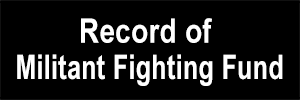“We have running water, but it’s not drinkable, we still have to boil it first,” retired hospital worker Luis Epardo told the Militant from Aguadilla, on the northwest tip of the island, Dec. 4. “And the mosquitos! It’s incredible, garbage and rubble from the damaged homes hasn’t been picked up.” The city government has sprayed insecticide from vehicles, he said, “but they say that only kills 5 percent.” Nonetheless, Health Department officials insist there has been no increase in mosquito-born diseases like Zika, dengue and chikungunya.
The government claims that only 58 people died from the storm, despite figures showing that in September alone 472 more people died than the year before. There was a similar jump in October. The gov’t figures don’t include deaths from lack of adequate medical care, not enough insulin or oxygen or being unable to get dialysis.
“The governor said that we would have electricity by Dec. 15, but we haven’t seen anybody working,” Luis Aristud, an insurance adjuster in Canóvanas, east of San Juan, said by phone.
“Many people in the U.S. who went through Hurricanes Katrina and Sandy still haven’t gotten help,” Aristud said. “Imagine us! They’re like a landlord. When you need something fixed, forget about it, but miss a rent payment, they call the cops.”
“We’ve been a colony ever since the U.S. invaded,” Aristud said. “Even though we’re U.S. citizens, we just have to take the dish they serve us, good, bad or so-so.”
“And people didn’t realize that the only part of their house that is insured, if they have insurance, is the part the bank owns,” he said, “not their belongings inside.”
There is no electricity at all on the island of Vieques, off Puerto Rico’s eastern shore, said Ismael Guadalupe, a retired school teacher and veteran leader of the successful fight to oust the U.S. Navy bombing range there. So many people have installed generators “that it just sounds like one big car at night,” he said.
El Nuevo Día reported that 1,200 poles for power lines — out of a promised 65,000 needed to get electricity back up — arrived at the San Juan port Nov. 30.
Justo González, acting executive director of the Electric Energy Authority, said Dec. 1 that 2,000 electrical workers from the U.S. will arrive “in the coming weeks” to speed up restoring power.
On Nov. 29, Federal Emergency Management Agency reported it had canceled a contract with Bronze Star company three weeks earlier, because they didn’t deliver a half million light tarps for hurricane victims. In addition, some 60,000 blue tarps are needed to put up on homes that lost their roofs, but FEMA says it is only able to install 350 a day due to lack of supplies.
It’s facts like these — little reported in the big-business press in the U.S. — that show that the people in the U.S. colony of Puerto Rico are suffering not from a “natural disaster,” but a man-made capitalist catastrophe.
Eliminating the Christmas bonus
William Hernández, a mechanical engineer, told the Militant electricity was restored three weeks ago at the pharmaceutical factory where he works in Guayama, on the southeast part of the island. Puerto Rico is a major center for medicine and medical supplies.
The Puerto Rican government exempted bosses at hundreds of private companies from paying the legally mandated annual Christmas bonuses that are a big part of workers’ yearly pay, because the storm cost them income.
“At the company where I work, they paid it,” Hernández said. “But where my friends work, they’re not going to pay. The pharmaceutical companies make big profits. They are using the tragedy of the hurricane to benefit themselves and it can’t be justified.”
Working people in Puerto Rico have been hit hard over the last decade by the worldwide capitalist economic crisis, exacerbated by the island’s colonial oppression. Dozens of factories have been shuttered and gross domestic product declined there every year since 2006. The government took out new loans to pay off earlier ones, and now the colonial government’s debt has soared to $74 billion. To keep paying the bondholders, the government closed schools, laid off thousands of public employees, reduced pensions, raised sales taxes and cut maintenance on the electrical grid. The effects of the hurricane deepened the crisis.
According to the island’s Labor and Human Resources Department, in October the number of people with a job or actively looking for one was 38.6 percent, the lowest level in 27 years. There were at least 54,000 fewer workers in October compared to last year.
In 2016 President Barack Obama appointed a Fiscal Responsibility and Oversight Board to press the colonial regime to cut back more on jobs, social services and other government expenses. The board has veto power over all of the government’s financial decisions to ensure the maximum payment possible on the debt.
Board members chastised Puerto Rican Gov. Ricardo Rosselló Nov. 27, saying his decision to pay the annual Christmas bonus to public employees this year “demonstrates a lack of fiscal discipline.” With the typical arrogance of the imperialist rulers, the board told Rosselló that they expect to be “consulted” on all such decisions in the future.
|
Printer-friendly version of this article |








 click here for information and literature from the Socialist Workers Party 2016 campaign
click here for information and literature from the Socialist Workers Party 2016 campaign a magazine of Marxist politics and theory from 1934 to the present
a magazine of Marxist politics and theory from 1934 to the present an international news magazine published from 1963 to 1986
an international news magazine published from 1963 to 1986 a socialist magazine in Spanish published from 1977 to 2005
a socialist magazine in Spanish published from 1977 to 2005




